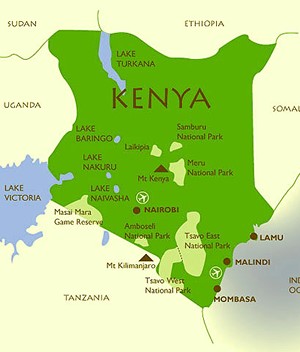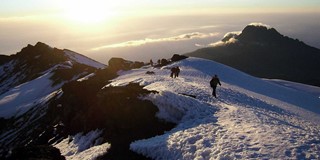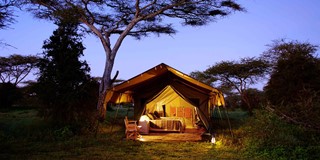
Tsavo East National Park
Speak to our tour consultants for a more custom made itinerary to suit your travel needs.
Tel: +254 706 124 625

- Background Information
- Game Viewing & Activities
Tsavo East and Tsavo West National Parks together make up the biggest national park in Kenya at just under 22 000 sq km. In May 1948, a month after the park's conception, Tsavo National Park was divided into east and west for administrative purposes. Named after the Tsavo River which flows from west to east, the park is considered one of the world's biodiversity strongholds.
Tsavo East is the only Kenyan park that permits night drives. It is a vast park and guests will often have to be patient during game viewing activities, but the reward is great. The experienced safari guides are familiar with the game movements and season migration paths and times of Tsavo's wildlife. Some of Tsavo East's popular attractions are Mudanda Rock, Yatta Plateau and Lugard Falls.
The surface of this part of Tsavo is essentially flat and covered with low, dry vegetation. The reserve is popular for short safaris from the Kenya coast, such as Mombasa, which makes for a stunning East Africa beach and bush vacation.
Tsavo East is generally flat with dry plains across which the Galana River flows. Feature attractions include the Yatta Plateau, Lugards Falls, Mudanda Rock and Aruba Dam. The water features in Tsavo offer an oasis-like appeal to the park and keep the wildlife present.
Game in Tsavo East includes the famous Big 5. Other sought after species are black rhino, hirola antelope, mongoose, giraffe, bat-eared fox, hyrax, Grevy's zebra, ground pangolin, Sykes's monkey, black-faced vervet monkey and dik dik, to name but a few. Over 500 species of bird have been recorded in the area, including ostrich, kestrel, starling, weaver bird, kingfisher, buzzard, hornbill, secretary bird and heron.
Tsavo lions are historically famous for not having manes (even the males), and as a result of this uncommonness, many lions have been hunted and killed in Tsavo. Kenya has banned hunting for many years now, but the closeness of Kenyan villages to its game reserves means that human-wildlife conflict has to be carefully managed.
::: Select Recommended Tours :::
-

Kilimanjaro Climb - 5Days Marangu
The Marangu route is one of the most popular routes to the summit of your Kilimanjaro Climb.
-

Zanzibar Luxury Beach Tour
Explore Zanzibar Beaches in style with exclusive access to top 5star properties in Zanzibar.
-

Kenya & Tanzania Adventure
Combine two of the best top Wildlife and Safari Destinations in East Africa - Kenya & Tanzania..